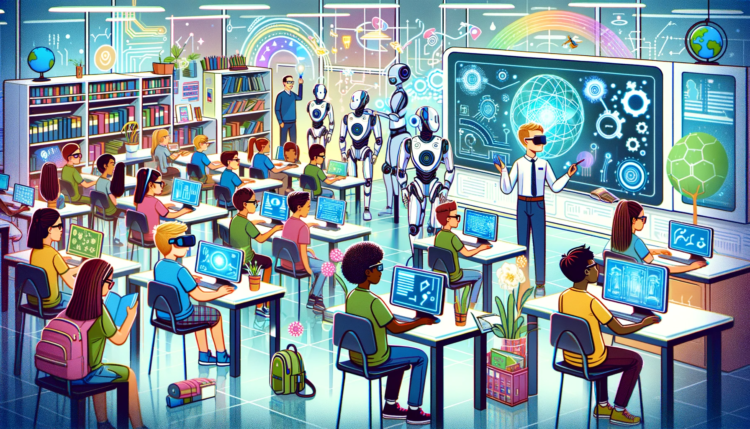- hazel
- January 7, 2024
- Artificial Intelligence in Education
The AI Revolution: Transforming K-12 Education
Introduction:
In the 21st century, education is no longer confined to textbooks and traditional classrooms. It has evolved into a dynamic, personalized experience, thanks to the integration of Artificial Intelligence (AI) in K-12 education. As we embark on a new year, it’s crucial to explore the profound impact of AI on educational methods and its role in shaping the future of learning.
AI’s Disruptive Influence:
The presence of AI in K-12 education is nothing short of a revolution. It challenges the conventional methods of teaching and learning by introducing intelligent algorithms and automation. This transformative force is altering the way educators, students, and institutions approach education.
Tailoring Education to Each Student:
One of the most remarkable aspects of AI in education is its ability to personalize learning experiences. No two students are alike, and AI recognizes this fact. By analyzing individual learning patterns and preferences, AI can craft a unique educational path for each student. This personalization not only enhances comprehension but also nurtures a love for learning.
Redefined Teaching Methods:
AI empowers educators to become even more effective mentors. It provides them with invaluable insights into student performance and areas requiring improvement. Armed with this data, teachers can adapt their teaching methods to suit the needs of their students. The result? A more engaged, motivated, and successful student body.
Enhancing Student Engagement:
Traditional classrooms often struggle with student engagement. AI introduces interactive learning materials, gamified lessons, and adaptive assessments, making the learning process not just informative but also enjoyable. It transforms education into an exciting journey rather than a mundane task.
Empowering Educators:
AI doesn’t replace teachers; it complements their abilities. Educators can leverage AI tools to streamline administrative tasks, such as grading and scheduling. This newfound efficiency allows educators to invest more time in fostering meaningful connections with their students and focusing on the art of teaching.
Preparation for an Uncertain Future:
In a rapidly changing world, adaptability and critical thinking are essential skills. AI equips students with these abilities by exposing them to cutting-edge technologies and problem-solving scenarios. It prepares them to thrive in an uncertain future job market.
The Road Ahead:
The journey of AI in K-12 education has just begun. As technology advances, we can expect AI-powered virtual tutors, data-driven decision-making, and innovative learning platforms. The future of education is not just about imparting knowledge; it’s about nurturing curious minds and fostering lifelong learners.
Conclusion:
As we embrace the AI revolution in K-12 education, we’re not just upgrading classrooms; we’re transforming the way society learns and grows. AI’s potential to personalize education, empower educators, and prepare students for the future is unparalleled. It’s a testament to the ever-evolving nature of education, where innovation is the driving force.
In a world where knowledge is power, AI in K-12 education is the key to unlocking the full potential of every learner and shaping a brighter future for generations to come.


